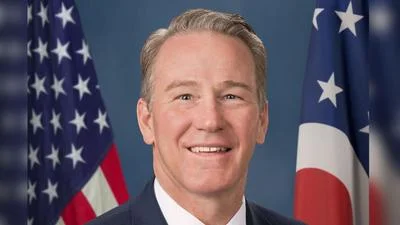Ohio Gov. Mike DeWine (L) and Adriana Martinez-Smiley (R) | Wikipedia/Linkedin
Ohio Gov. Mike DeWine (L) and Adriana Martinez-Smiley (R) | Wikipedia/Linkedin
Built in 1823, Ohio Gov. Mike DeWine's house two miles north of Cedarville is 16 rooms in a Queen Anne-style with a roof made from tile, imported from England.
On six acres with scattered Buckeye trees, the property is on the National Register of Historic Places.
And it will not be adjacent to an industrial solar panel farm.
That's because DeWine's "Ohio Power Siting Board" (OPSB), the seven-person panel that evaluates applications for large-scale, government-subsdized solar panel farms across the state, rejected a proposal to build one on 1,500 Greene County acres, about a half mile from DeWine's home.
The Greene County proposal is one of just three the OPSB has denied since it started taking solar farm applications in 2018.
It has approved a total of 45 solar farm projects, according to the OPSB web site.
The board's other two solar farm rejections-- in Lima and just outside Defiance-- were for projects in the districts Ohio Senate President Matt Huffman (R-Lima) and Ohio Senate Majority Floor Leader Rob McColley (R-Napoleon). Both are close DeWine allies, who unlike the governor, plan to run for re-election.
The OPSB determined all three projects, opposed nearly universally by township and county elected officials, as well as the state senators themselves, were not in the “public interest, convenience and necessity as required by Ohio law." It cited local opposition to the projects, though every solar project proposed in Ohio has generated a host of it.
Just this month, the OPSB approved building the largest proposed Ohio solar panel farm yet, on 6,050 acres in Madison County, west of Columbus.
That's even as the Madison County Board of Commissioners voted against the project, as did local township boards and voters, more immediately, themselves. In the March 19 GOP primary elections, they backed an anti-solar farm county commissioner candidate. Brendan Shea, over pro-solar farm 15 year incumbent Mark Forrest by 36 percentage points.
Anti-solar farm voters delivered a similar result in Knox County, ousting three term, pro-solar county commission incumbent Thom Collier, who took third of three candidates in his re-election bid.
The Madison County solar panel farm, on farmland near the intersection of Urbana-West Jefferson Road and State Route 38, owned partially by Microsoft billionaire Bill Gates, would be one of the largest in the U.S., developed by a subsidary of Royal Dutch Shell, the London-based multinational oil and gas giant.
"Environment and Indigenous Affairs Reporter"
Adriana Martinez-Smiley reported on the Madison County OPSB approval for WYSO, a Yellow Springs-based affiliate of government-funded National Public Radio.
She characterized the opposition as limited to "appointed board members who live near the project area."
Martinez-Smiley, a Northwestern University's Medill School of Journalism graduate and Hamilton native who says others should call her "they," not "her," is one of a growing host of government-funded journalists making the pro-solar case for Ohioans.
They include writers at the the Ohio Capital Journal, funded by solar energy investor, billionaire New York hedge fund manager Tom Steyer, and pro-solar activist Kathiann Kowalski of Cleveland, writing for the "Energy News Network."
Kowalski argued that "misinformation" pushed by local officials and farmers is driving growing opposition to solar panel farms. She has sought to counter concerns over soil contanimation and the unreliablity of solar power in cold conditions, which led to blackouts in Texas.
"False and unsubstantiated claims about renewable energy have flourished for years, but critics say different forms of misinformation played a big role in Ohio lawmakers’ latest move to stifle the growth of wind and solar energy," Kowalski wrote.
She was criticizing a 2021 bill co-sponsored by McColley that allowed county and township officials to bar solar farm development, signed into law by Dewine.
The bill allowed local officials to stop solar projects moving forward, but grandfathered in those for which applications had already been filed with the OPSB, allowing them to end run voters and local officials, like the solar farm in Madison County.
All seven OPSB members were appointed by DeWine.
They include former Franklin County Judge and Westerville City Council Member Jenifer French, Ohio Dept. of Natural Resources director Mary Mertz, Ohio Dept. of Public Health director Bruce Vanderhoff, Ohio EPA director Anne Vogel, Ohio Dept. of Development director Lydia Mihalik, Ohio Dept. of Agriculture director Brian Baldridge and "public member" Gregory Sloane of Westerville.






 Alerts Sign-up
Alerts Sign-up